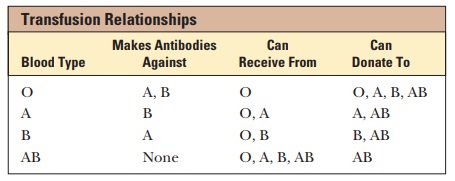Chapter: Biochemistry: Carbohydrates
Glycoproteins and Blood Transfusions
Glycoproteins and Blood
Transfusions
If a blood transfusion is attempted with incompatible blood types,
as when blood from a type-A donor is given to a type-B recipient, an
antigen–antibody reaction takes place because the type-B recipient has
antibodies to the type-A blood. The characteristic oligosaccharide residues of
type-A blood cells serve as the antigen. A cross-linking reaction occurs
between antigens and antibodies, and the blood cells clump together. In the
case of a transfusion of type-B blood to a type-A recipient, antibodies to
type-B blood produce the same result. Type-O blood has neither antigenic
determinant, and so people with type-O blood are considered universal donors.
However, these people have antibodies to both type-A and type-B blood, and so
they are not universal acceptors. Type-AB people have both antigenic
determinants. As a result, they do not produce either type of antibody; they are universal acceptors.

Related Topics